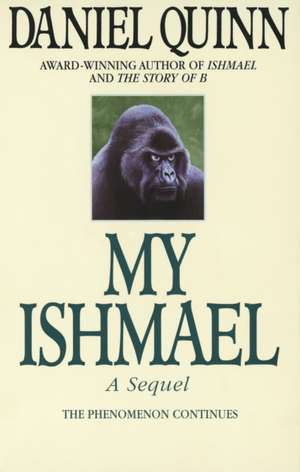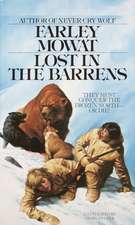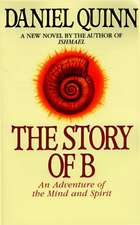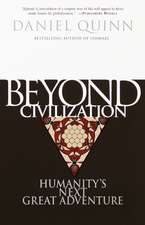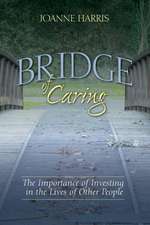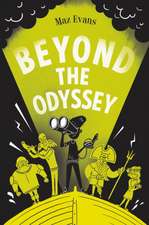My Ishmael: Ishmael Series
Autor Daniel Quinnen Limba Engleză Paperback – 30 sep 1998
When Ishmael places an advertisement for pupils with "an earnest desire to save the world," he does not expect a child to answer him. But twelve-year-old Julie Gerchak is undaunted by Ishmael's reluctance to teach someone so young, and convinces him to take her on as his next student. Ishmael knows he can't apply the same strategies with Julie that he used with his first pupil, Alan Lomax--nor can he hope for the same outcome. But young Julie proves that she is ready to forge her own spiritual path--and arrive at her own destination. And when the time comes to choose a pupil to carry out his greatest mission yet, Ishmael makes a daring decision--a choice that just might change the world.
Preț: 101.04 lei
Nou
19.33€ • 20.19$ • 16.00£
Carte disponibilă
Livrare economică 14-28 martie
Specificații
ISBN-10: 0553379658
Pagini: 304
Dimensiuni: 135 x 209 x 17 mm
Greutate: 0.24 kg
Editura: Bantam Books
Seria Ishmael Series
Notă biografică
Daniel Quinn's first book, Ishmael, won the Turner Tomorrow Fellowship, a prize for fiction presenting creative and positive solutions to global problems. He is also the author of Providence, The Story of B, and My Ishmael.
Extras
"Among her friends in college," Ishmael began, "my benefactor, Rachel Sokolow, counted a young man named Jeffrey, whose father was an affluent surgeon. Jeffrey became an important person in many lives at this time and later, because he presented people with a problem. He couldn't figure out what to do with himself. He was physically attractive, intelligent, personable, and talented at almost anything he turned his hand to. He could play the guitar well, though he had no interest in a musical career. He could take a good photograph, produce a good sketch, play the lead in a school play, and write an entertaining story or a provocative essay, but he didn't want to be a photographer, an artist, an actor, or a writer. He did well in all his classes but didn't want to be a teacher or a scholar and wasn't interested in following his father's footsteps or in pursuing a career in law, the sciences, mathematics, business, or politics. He was drawn to things of the spirit and was an occasional churchgoer but didn't care to become a theologian or a clergyman. In spite of all this, he seemed "well-adjusted,' as it's called. He wasn't notably phobic or depressive or neurotic. He wasn't doubtful or confused about his sexual orientation. He figured he'd settle down and marry one day, but not until he'd found some purpose in life.
"Jeffrey's friends never tired of finding new ideas to present to him in hopes of awakening his interest. Wouldn't he enjoy reviewing films for the local newspaper? Had he ever thought of taking up scrimshaw or jewelry making? Cabinetry was put forward as a soul-satisfying occupation. How about fossil hunting? Gourmet cooking? Maybe he should get into Scouting. Or wouldn't it be fun to go on an archaeological dig? Jeffrey's father was completely sympathetic with his inability to discover an enthusiasm and ready to support him in whatever exploration he might find worthwhile. If a world tour had any appeal, a travel agent would be put to work on it. If he wanted to try the life of an outdoorsman, equipment would be supplied, gladly. If he wanted to take to the sea, a boat would be made ready. If he wanted to try his hand at pottery, he'd have a kiln waiting for him. Even if he just wanted to be a social butterfly, that would be fine. He shrugged it all off, politely, embarrassed to be putting everyone to so much trouble.
"I don't want to give you the impression he was lazy or spoiled. He was always at the top of his class, always held a part-time job, lived in ordinary student housing, didn't own a car. He just looked at the world that was on offer to him and couldn't see a single thing in it worth having. His friends kept saying to him, "Look, you can't go on this way. You've got too much going for you. You've just got to get some ambition, got to find something you want to do with your life!'
"Jeffrey graduated with honors but without a direction. After hanging around his father's house for the summer, he went to visit some college friends who had just gotten married. He took along his knapsack, his guitar, his journal. After a few weeks he set out to visit some other friends, hitchhiking. He was in no hurry. He stopped along the way, helped some people who were building a barn, earned enough money to keep going, and eventually reached his next destination. Soon it was getting on for winter and he headed home. He and his father had long conversations, played gin rummy, played pool, played tennis, watched football, drank beer, read books, went to movies.
"When spring came, Jeffrey bought a secondhand car and set out to visit friends in the other direction. People took him in wherever he went. They liked him and felt sorry for him, he was so rootless, so ineffectual, so unfocused. But they didn't give up on him. One person wanted to buy him a video camera so he could make a film of his wanderings. Jeffrey wasn't interested. Another person volunteered to send his poetry around to magazines to see if anyone would publish it. Jeffrey said that was fine, but personally, he didn't care one way or the other. After working at a boys' camp for the summer, he was asked to stay on as a permanent member of the staff, but it didn't appeal to him that much.
"When winter came, his father talked him into seeing a psychotherapist he knew and trusted. Jeffrey stuck with it throughout the winter, going three times a week, but in the end the therapist had to admit that, apart from being "a little immature,' there was nothing whatever wrong with him. Asked what "a little immature' meant, the therapist said Jeffrey was unmotivated, unfocused, and lacked goals--everything they already knew. "He'll find something in a year or two,' the therapist predicted. "And it'll probably be something very obvious. I'm sure it's staring him in the face right now, and he just doesn't see it.' When spring came, Jeffrey went back out on the road, and if something was staring him in the face, he went on being unable to see it.
"The years drifted by in this way. Jeffrey watched old friends get married, raise children, build careers, build businesses, win a little fame here, a little fortune there . . . while he went on playing his guitar, writing a poem now and then, and filling one journal after another. Just last spring he celebrated his thirty-first birthday with friends at a vacation cottage on a lake in Wisconsin. In the morning he walked down to the water, wrote a few lines in his journal, then waded into the lake and drowned himself."
"Sad," I said after a moment, unable to think of anything more brilliant.
"It's a commonplace story, Julie, except for one fact--the fact that Jeffrey's father made it possible for him to drift, actually supported him while he did nothing for nearly ten years--put no pressure on him to shape up and become a responsible adult. That's what made Jeffrey different from millions of other young people in your culture who in fact have no more motivation than he did. Or do you think I'm mistaken in this?"
"I don't understand you well enough to say whether you're mistaken."
"Thinking of the young people you know, do you find them burning to be out there becoming lawyers and bankers and engineers and cooks and hairstylists and insurance agents and bus drivers?"
"Some of them, yeah. Not especially to be the things you mentioned, hairstylists and bus drivers, but some things. I know kids who wouldn't mind being movie stars and professional athletes, for example."
"And what are their chances of becoming these things, realistically speaking?"
"Millions to one, I suppose."
"Do you think there are eighteen-year-olds out there dreaming of becoming cabdrivers or dental technicians or asphalt spreaders?"
"No."
"Do you think there are a lot of eighteen-year-olds out there who are like Jeffrey, who are not really attracted to anything in the Taker world of work? Who would be glad to skip it entirely if someone gave them an annual stipend of twenty or thirty thousand dollars?"
"God yes, if you put it like that, I'm sure there are. Are you kidding? Millions of them."
"But if there isn't anything they really want to do in the Taker world of work, why do they enter it at all? Why do they take jobs that are clearly not meaningful to them or to anyone else?"
"They take them because they have to. Their parents throw them out of the house. They either get jobs or starve."
"That's right. But of course in every graduating class there are a few who would just as soon starve. People used to call them tramps or bums or hobos. Nowadays they often characterize themselves as "homeless,' suggesting that they live on the street because they're forced to, not because they prefer to. They're runaways, beachcombers, ad hoc hookers and hustlers, muggers, bag ladies, and Dumpster divers. They scrounge a living one way or another. The food may be under lock and key, but they've found all the cracks in the strongroom wall. They roll drunks and collect aluminum cans. They panhandle, haunt restaurant garbage cans, and practice petty thievery. It isn't an easy life, but they'd rather live this way than get a meaningless job and live like the mass of urban poor. This is actually a very large subculture, Julie."
"Yeah, I recognize it now that you put it this way. I actually know kids who talk about wanting to go live on the street. They talk about going to specific cities where there are already a lot of kids doing it. I think Seattle is one."
"This phenomenon shades off into the phenomena of juvenile gangs and cults. When these street urchins are organized around charismatic warlords, they're perceived as gangs. When they're organized around charismatic gurus, they're perceived as cults. Children living on the street have a very low life expectancy, and it doesn't take them long to realize that. They see their friends die in their teens or early twenties, and they know their fate is going to be the same. Even so, they can't bring themselves to rent some hovel, collect some decent clothes, and try to get some stupid minimum-wage job they hate. Do you see what I'm saying, Julie? Jeffrey is just the upper-class representative of the phenomenon. The lower-class representatives don't have the privilege of drowning themselves in nice clean lakes in Wisconsin, but what they're doing comes to the same thing. They'd as soon be dead as join the ranks of ordinary urban paupers, and they generally are soon dead."
"I see all that," I told him. "What I don't see yet is the point you're making."
"I haven't really made a point yet, Julie. I'm drawing your attention to something the people of your culture want to pretend is of no importance, is irrelevant. The story of Jeffrey is terribly sad--but he's a rarity, isn't he? You might be concerned if there were thousands of Jeffreys walking into lakes. But young riffraff dying on your streets by the thousands is something you can safely ignore."
"Yes, that's true."
"What I'm looking at is something the people of your culture feel sure doesn't need to be looked at. These are drug addicts, losers, gangsters, trash. The adult attitude toward them is, "If they want to live like animals, let them live like animals. If they want to kill themselves off, let them kill themselves off. They're defectives, sociopaths, and misfits, and we're well rid of them."'
"Yeah, I'd say that's how most grown-ups feel about it."
"They're in a state of denial, Julie, and what is it they're denying?"
"They're denying that these are their children. These are somebody else's children."
"That's right. There is no message for you in a Jeffrey drowning himself in the lake or a Susie dying of an overdose in the gutter. There's no message for you in the tens of thousands who kill themselves annually, who disappear into the streets, leaving behind nothing but faces on milk cartons. This is no message. This is like static on the radio, something to be ignored, and the more you ignore it, the better the music sounds."
"Very true. But I'm still groping for your point."
"No one would think of asking themselves, "What do these children need?"'
"God no. Who cares what they need?"
"But you can ask yourself that, can't you? Can you bring yourself to it, Julie? Can you bear it?"
I sat there for a minute, staring at nothing, and suddenly the goddamnedest thing happened: I burst into tears. I exploded into tears. I sat there completely overwhelmed in great, huge racking sobs that wouldn't go away, wouldn't go away, until I began to think I'd found my life's work, to sit in that chair and sob.
When I began to settle down, I stood up, told Ishmael I'd be back in a while, and went out for a walk around the block--around a couple blocks, in fact.
Then I went back and told him I didn't know how to put it into words.
"You can't put the emotions into words, Julie. I know that. You put those into sobs, and there are no words equivalent to that. But there are other things you can put into words."
"Yeah, I suppose that's true."
"You had some sort of vision of the devastating loss you share with the young people we've been talking about."
"Yeah. I didn't know I shared it with them. I didn't know I shared anything with them."
"The first day you visited me, you said you're constantly telling yourself, "I've got to get out of here, I've got to get out of here.' You said this meant "Run for your life!"'
"Yeah. I guess you could say that's what I was feeling as I sat here crying. Please! Please let me run for my life! Please let me out of here! Please, let me go! Please don't keep me penned up here for the rest of my life! I've GOTTA run! I can't STAND this!"
"But these aren't thoughts you can share with your classmates."
"These aren't thoughts I could have shared with myself two weeks ago."
"You wouldn't have dared to look at them."
"No, if I'd looked at them, I would've said, "My God, what's wrong with me? I must have a disease of some kind!"'
"These are exactly the kinds of thoughts that Jeffrey wrote in his journal again and again. "What's wrong with me? What's wrong with me? There must be something terribly wrong with me that I'm unable to find joy in the world of work.' Always he wrote, "What's wrong with me, what's wrong with me, what's wrong with me?' And of course all his friends were forever saying to him, "What's wrong with you, what's wrong with you, what's wrong with you that you can't get with this wonderful program?' Perhaps you understand for the first time now that my role here is to bring you this tremendous news, that there's nothing wrong here with YOU. You are not what's wrong. And I think there was an element of this understanding in your sobs: "My God, it isn't me!"'
"Yes, you're right. Half of what I was feeling was a tremendous sense of relief."
From the Hardcover edition.
Recenzii
--Susan Chernak McElroy, author of Animals as Teachers & Healers
"Irresistible...[Quinn's] ideas are as thought-provoking as ever."
--Kirkus Reviews
Descriere
Winner of the Turner Tomorrow Fellowship, Daniel Quinn's Ishmael is a bestseller and a testament for a burgeoning spiritual movement. Now Quinn presents an extraordinary sequel, a companion novel so startlingly original that even Ishmael's most faithful readers will not predict its outcome....
When Ishmael places an advertisement for pupils with "an earnest desire to save the world," he does not expect a child to answer him. But twelve-year-old Julie Gerchak is undaunted by Ishmael's reluctance to teach someone so young, and convinces him to take her on as his next student. Ishmael knows he can't apply the same strategies with Julie that he used with his first pupil, Alan Lomax--nor can he hope for the same outcome. But young Julie proves that she is ready to forge her own spiritual path--and arrive at her own destination. And when the time comes to choose a pupil to carry out his greatest mission yet, Ishmael makes a daring decision--a choice that just might change the world.
